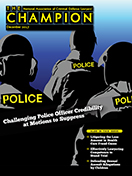December 2017

When arguing a motion to suppress evidence, how can a defense attorney strip away the presumption of trustworthiness a police officer has?
Articles in this Issue
-
Affiliate News
Affiliate News - December 2017 Champion Magazine.
-
An Introduction to Litigating the Loss Amount in Health Care Fraud Cases
Exaggerated “loss amounts” proposed by the government in health care fraud cases can arbitrarily increase a client’s sentencing exposure by a significant amount. Defense counsel should consider whether invalid statistical samples were used; determine if the “net loss approach” will benefit the client; and, in a conspiracy case, consider whether the client’s culpability was less than that of the co-conspirators.
-
Breaking Blue: Challenging Police Officer Credibility at Motions to Suppress
Police officers are viewed as inherently trustworthy, especially when attorneys argue a motion to suppress evidence seized in searches. To have a fighting chance at winning the motion, defense attorneys must strip away the presumption of trustworthiness that comes with a badge and a gun. Jennifer Sellitti recommends that the defense team record and comment on police officers’ demeanor, argue noncompliance with established procedure, explore bias more fully, and make it personal by telling the story of the client’s experience.
-
Competent on Competence: Understanding the Duties and Approaches
to Effectively Address a Client’s Incompetence to Stand Trial
Lawyers have an obligation to investigate a client’s possible incompetence and to bring the issue to the attention of the trial court when necessary. John Philipsborn writes that defense lawyers should resist attempts by trial courts to marginalize lawyers’ stated concerns about the client’s competence. Lawyers should be prepared to argue that rulings from the U.S. Supreme Court explain the utility of information on competency.
-
Defending Sexual Assault Allegations by Children - Using Forensic Interview Protocols to Your Advant
The goal of forensic interviewing is to ensure that statements from a child accuser are obtained in an unbiased manner. Social scientists have performed experiments to pinpoint how to minimize child suggestibility. To attack a forensic interview, defense lawyers should do the following: (1) become familiar with the jurisdiction’s protocols for forensic interviews, (2) examine statutes and rules regarding protocols and admissibility of child witness statements, (3) engage an expert and identify places where the protocols were not followed, (4) move to suppress when the protocols were not followed, and (5) decide how to highlight the failure of the forensic interviewer.
-
From the President: Coming and Going - Racial Disparity in the Punishment and Profit of Marijuana
Even as the United States comes to terms with the true motives of the government’s past policy regarding marijuana and even as some states undertake campaigns to legalize, racism still influences the policing of marijuana.
-
Inside NACDL: Mercy on Death Row
Mercy does not surface often on death row. That is what makes the story of Jason McGehee so remarkable.
-
NACDL® 2018 Election Procedures
NACDL® 2018 Election Procedures.
-
State Criminal Justice Network - Legislative Update
State Criminal Justice Network - Legislative Update. 2017 State Legislative Victories Summary.
-
We, the Jury: The Sleeping Juror
What should the defense lawyer do when a juror is sleeping or not paying attention?
